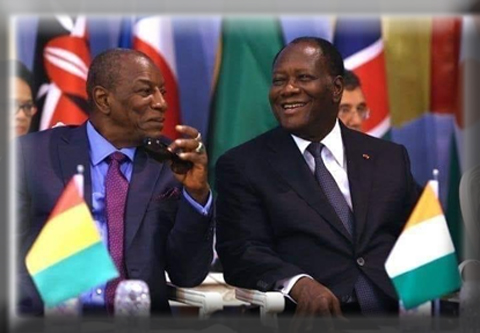West Africa: Reckless and Dangerous 3rd Terms in Guinea and Ivory Coast
By Abdoulaye W. Dukulé
The Perspective
Atlanta, Georgia
December 25, 2020
Alpha Condé of Guinea and Alassane Ouattara of Ivory Coast Outgoing presidents Alassane Ouattara of Ivory Coast and Alpha Condé of Guinea enthroned themselves and took an oath to “defend the Constitution.” Both men amended their constitutions to stay in power. They organized violence-ridden elections and one after the other, in well-choreographed political ballet, were sworn in for a 3rd term, one day apart. Two of the leaders of the Ivorian opposition, former President Henri Konan Bédié (PDCI), and former prime minister Guillaume Soro were both allies of Ouattara and went along with the changes. As the saying goes, elections are not stolen on the day the ballots are cast, it happened long before. In Guinea, Condé ran a referendum during the Covid-19 lockdown and made constitutional amendments.
Ouattara and Condé claimed to be making great personal sacrifices to preserve peace and national unity by accepting to run again. Ouattara, under the current constitution, could appoint his brother, the minister of state for presidential affairs, his wife, or the Imam of his hometown as vice-president.
Since the two men announced their candidacies, more than 300 people have died in the two countries. The number of wounded is in the thousands. In Ivory Coast, every leader of the opposition is either in jail or in exile. Three of them were tried and sentenced in abstention to the same 20 years of prison term, although the “crimes” were different. The Secretary-General of PDCI was arrested in the house of the leader of the party, former President Bédié, in the middle of a meeting. He fell ill while in detention and had to be evacuated to France.
In his inaugural speech, Ouattara said he will create a Ministry of National Reconciliation. A few years ago, he discarded the peace and reconciliation process. To follow up on his promise, a day later, he appointed as Minister of National Reconciliation a man that everyone in the opposition calls a “traitor,” KOUADIO KONAN BERTIN, the sole candidate who left the PDCI to take part in the electoral process, amassing 1.9 percent of the votes. The opposition has termed the appointment an “insult” and said it will not enter talks with him or Ouattara.
Ouattara added that said he would implement the recommendations of ECOWAS regarding the Elections Commission, something he was asked to do a year ago. Ivory Coast has never been as polarized as it is today. Ouattara’s “affirmative action“ policy which heavily favors his northern Islamic brethren will likely give an ethnic and religious layer to the crisis. In Guinea, Condé did the same.
With more than 40 percent of the GDP of francophone West Africa, serving as an entry point of investment for landlocked countries and with millions of immigrants from neighboring nations, any upheaval in Ivory Coast will have severe repercussions in the region. Ouattara and Condé have set in motion the perfect political storm.
In Ivory Coast, the opposition vows to push and is calling for a UN sponsored-national dialogue that will give birth to a new constitution and a new government. Bédié and his colleagues are left with two choices: surrender and accept a third term for Ouattara or work to remove him any way they can. For the UN to get involved in any such project, Ouattara must give his consent. But doing so will mean admitting that his election was fraudulent.
On the regional scene, relations between the two biggest economies, Nigeria and Ivory Coast are far from being cordial. It started last year in December, when Ouattara, during a visit of French President Macron, announced that the francophone countries would adopt a new currency, called ECO, just as the regional currency which has been in preparation and was expected to be introduced in 2020. In a swift reaction, Nigerian President Buhari said the move was a slap in the face. At a recent video-summit of ECOWAS, Buhari said and tweeted that it was wrong for people to tweak the constitution to stay in power. He did not attend either inauguration or sent any official representation. South African President, Chairman of the African Union, who also voiced his opposition to 3rd term, attended neither inaugurations but sent a minister.
Buhari and Ouattara lead the two largest economies in the subregion. This antagonism will put a damp on ECOWAS. It will affect future projects which are important milestones towards integration, such as trade, health, and security. The evolving terrorist crisis in the Sahara now linked to an expanding Boko Haram in Nigeria could and will get worse.
Ouattara still has time to make good on his intention to pass the baton to a new generation. He can spare Ivory Coast and the subregion another bloodshed. He can appoint a younger person as a vice-president, retire and allow his successor to carry-out a transition towards a more inclusive political process. Many capable youngsters are not party to this “conflict of elders,” which opposed Bédié, Ouattara, and Gbagbo since 1993 and has defined Ivorian politics. Condé can do the same. Meanwhile, the two nations will live under political and social stress. In Abidjan, there will be no firecrackers or fireworks for the festive seasons.
ECOWAS and AU could push for a peaceful resolution but because of their slow pace and the fact that Ouattara has disregarded all their recommendations, the opposition no longer has confidence in them, thus the call on the UN. Ouattara and Condé have dealt a serious blow to democracy and integration in West Africa.
